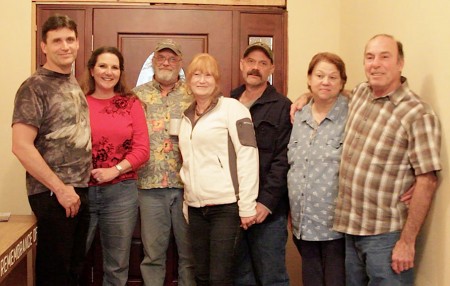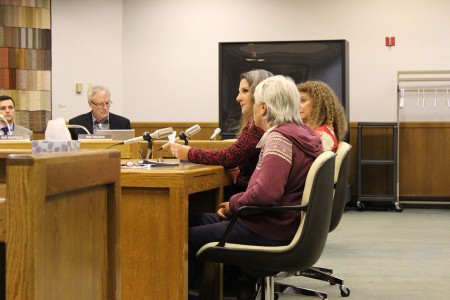""To be a realist, you need to understand both sides of the issue.""
Kathryn and I enjoy an afternoon under the tall trees as a nice breeze rolls through her property in Cedar Valley. I ask about her childhood, and how she got involved in the pesticide reform movement. As she tells stories from her past, Kathryn Rickard never imagined she would one day be testifying at the State Capitol, urging her legislators to change forest practices in Oregon.
 Kathryn describes the terrane of the Oregon Coast, “We have mountains, we have inversions, we have wind, we have fog.”
Kathryn describes the terrane of the Oregon Coast, “We have mountains, we have inversions, we have wind, we have fog.”
Kathryn is a third-generation, logger’s daughter who spent her early years in the forests of Roseburg, Oregon. Her father owned his own company, Sebastian Logging, where she learned valuable life lessons working in the field. “His idea was that we all needed to understand where our food came from and where are clothes came from. He wanted to teach us a good work ethic.” She reminisces on days with her father in the forest, “I loved walking behind him in the woods; he could walk a stand of timber and just look at it and tell you how many board feet he could get out of it. He loved teaching me all of the different kinds of trees. One of my favorite smells when he’d come home was wood chips and sweat.” The forest gave her a home, a sense of place, and with that came knowledge, skill, and opportunity.
Just like her father working up the ladder to own his own company, Kathryn did the same in the field. From setting chokers, bucking limbs, and driving the D8 Cat, she was taught to hold her own in and out of the forest. With the connection she had with the land, she learned a lot about herself and her values. “That’s what my dad, that’s what logging, made of me. Pretty self-sufficient.”
The strength, bravery, and passion Kathryn learned in the forest stayed with her throughout her life. Kathryn is now involved with the pesticide reform movement where she resides in Curry County on the Oregon Coast. She became involved in this issue in 2013, when an aerial herbicide applicator dripped herbicides onto her property while spraying a nearby clear cut. Kathryn and 45 other members of the community came forward to talk and take action surrounding the effects the incident had on the community.
The folks of Gold Beach and Curry County joined together with the help of Lisa Arkin, the Executive Director of the nonprofit, Beyond Toxics, based in Eugene, Oregon. With this support, Kathryn began researching, investigating, and ultimately becoming involved in a much larger issue than what she experienced in 2013.
 Kathryn stands proud with her Cedar Valley support group and action team.
Kathryn stands proud with her Cedar Valley support group and action team.
Over 13 different counties have come together to support one another and take action on this issue. Kathryn suggests, “for people who are in this situation, I strongly suggest that you get yourself affiliated with a group of people who have lived this, just for the support… sometimes it’s just a phone call, sometimes it’s just a hug, sometimes we cry together, but that support group is what you really need to be able to keep forging through.”
Kathryn has found the bureaucratic system to be more of a “maze” than a pathway, and has found help from advocates, such as Lisa Arkin to help her through this landscape. She voiced her concerns about the urgency of state agencies, “you cannot help me and do an appropriate investigation when you are trying to protect the very people who have harmed me. That is one of the reasons I am very supportive of the reforms that we’ve been trying to get passed… because when [agencies] are mandated to do both, they can’t.”
With the support of her neighbors, Beyond Toxics, and the voices of many concerned Oregonians, the action groups came together to draft Senate Bill 613. SB 613 advocated “for buffer zones on water and schools, for advance notification so that people could get out of the way, and for accurate record keeping so that they would have to file exactly what was sprayed within three days of a spray. So that if and when there was an incident, they would be able to respond quickly, knowing what types of chemicals were sprayed, and how to protect the people.”
The bill died earlier this year along with a few others surrounding aerial herbicide spraying.
Rather than give up, Kathryn remains extremely motivated hopeful for change. “Now we’re back to the drawing board. What can we do? How could we have worded it differently? How can we present a bill that people are going to feel more comfortable with and still protect human lives?”
She continues to attend hearings for current legislation, stay active in her community, and remains passionate about protecting community health. She is active with the Oregon Coastal Caucus and has addressed the League of Women Voters on multiple occasions. By continuing to share her story with people through different mediums, Kathryn is keeping the dialogue about this issue alive. Throughout all of her efforts, Kathryn’s passion is as vibrant in her actions as in her words, “the citizens in the United States, or even just this state alone, [need to] stand up and in one voice say, “enough, we want to see change, we want to see our health improve, and we want to have clean drinking water.”
 Kathryn Rickard, Nancy Webster, and Lisa Arkin sharing their testimonies during a House hearing for industry-proposed, House Bill 3549.
Kathryn Rickard, Nancy Webster, and Lisa Arkin sharing their testimonies during a House hearing for industry-proposed, House Bill 3549.
Kathryn understands firsthand how important the logging industry is to Oregonians. She is not against logging, but supports environmental and community health. She holds a unique position about this issue and hopes to bring both sides of the issue to a common ground, “and try to live in the world together rather than opposed”.

